Les traditions discursives dans la Romania médiévale - Research workshop, Klagenfurt, December 16th, 2025
On December 16th, an international conference on the question of Discourse Tradition(s) will take place in Klagenfurt, organized by the local Romance Seminar and the academy project "Bibelglossare als verborgene Kulturträger". Participants will include representatives from the academy projects "ALMA - Wissensnetze in der mittelalterlichen Romania" and "Bibelglossare als verborgene Kulturträger".
Medieval Knowledge Cultures in the Mediterranean Region: Polycentric Knowledge Transfer and the Development of Romance Technical Languages
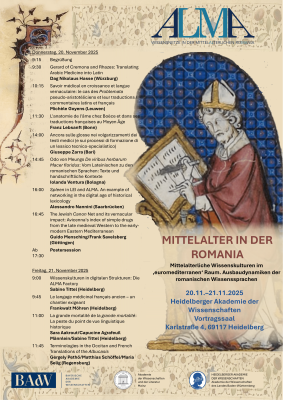
For the Mediterranean region, and thus for the Romance languages, contact between the Arabic, Jewish, Byzantine, and Latin worlds played a decisive role throughout the Middle Ages. The emergence of knowledge cultures, and particularly the history of medicine, was strongly shaped by these interconnections across linguistic and religious boundaries. The ALMA project, funded within the Academies Programme since autumn 2022, aims to investigate the development of Romance technical languages from 1100 to 1500 and to shed light on the cognitive-conceptual and linguistic aspects of this process. One of the domains that the project examines paradigmatically is medicine—a domain significantly influenced by cultural contact and knowledge transfer between ancient Greek, Jewish, and Arabic traditions, as well as the early reception in Medieval Latin and Romance vernaculars. The planned conference will explore this polycentric knowledge transfer as one of the central prerequisites for the linguistic development processes analyzed by ALMA. In dialogue with researchers from history, the history of knowledge, textual philology, and linguistics, the conference will examine the constellations that enable contact and transfer processes—processes of differentiation or appropriation—in the domain of medical knowledge. This will provide the necessary framework to embed conceptual and linguistic changes in their respective reception and production contexts and to make their historical conditions transparent.
Liste ed enumerazioni nelle letterature dell’occidente medievale incontro dei progetti romance enumerations repertory e Bibelglossare als verborgene Kulturträger, Università di Bergamo, October 28-29, 2025
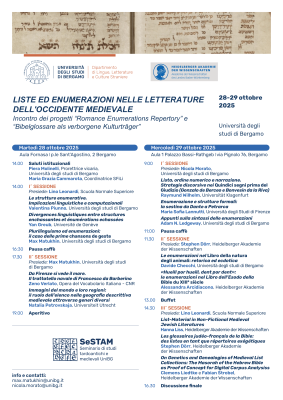
As part of the cooperation between the University of Bergamo and the Heidelberg Academy of Sciences and Humanities, an international conference on lists and enumerations will take place on October 28th and 29th, with the academy project "Bibelglossare als verborgene Kulturträger" represented on site by three participants.
Lecture "What about nouns in Maqre Dardeqe?"
On May 21, 2025, at 6:15 PM, in the Ernst-Robert-Curtius Saal of the Romanisches Seminar at Heidelberg University, a public lecture on "What about nouns in Maqre Dardeqe" by Judith Kogel, organized by the Project 'Bibelglossare' and the Abraham Berliner Center, will take place.
The Maqre Dardeqe is an alphabetically organized glossary (the oldest manuscript dates back to around 1410) listing lexemes of Biblical Hebrew by their roots. After the root follows an Old/Middle French word, which unlike other Judeo-French glossaries, is not vocalized. Hence, the text is of great interest to both Hebraists and Romanists.
Mrs. Kogel is a recognized expert on Judeo-French texts in general and on the Maqre Dardeqe in particular.
Celebration on the Occasion of Starting the Cooperation of the Project ‘Bible Glossaries’ and the University of Bergamo
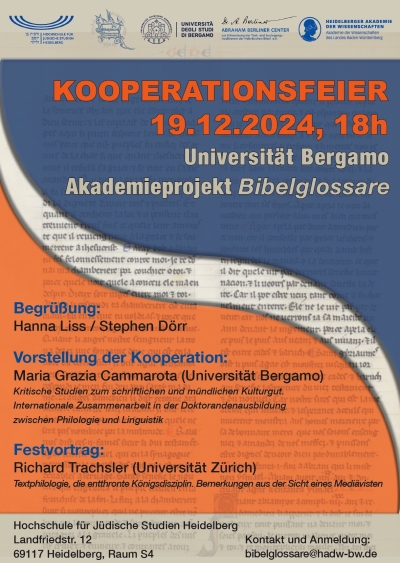
Celebration on the occasion of starting the cooperation of the project ‘Bible Glossaries’ and the University of Bergamo
The FRM Heidelberg would like to draw your attention to the following event:
The project Bible Glossaries as Hidden Cultural Carriers and the University of Bergamo will celebrate the start of their joint cooperation on the 19th of December 2024 at 18:00. After a welcome by Hanna Liss and Stephen Dörr, Maria Grazia Cammarato (University of Bergamo) will present the contents of the cooperation and Richard Trachsler (University of Zurich) will give a keynote speech.
Everybody is welcome to attend; please register at bibelglossare@hadw-bw.de.
Advanced Seminar / Introductory Seminar+ ‘Text philology in practice: Joint preparation of the edition of a medieval French manuscript’
The winter semester 2024-2025 will start soon, and from October 24th 2024 on, the advanced seminar / proseminar+ on digital edition philology by S. Tittel will take place every Thursday at 9-11 a.m. c.t., in the main building of the department of Romance Studies of Heidelberg University, in room 020.
Guest students are very welcome.
Description:
In this practice-orientated course based on the methods of Digital Humanities, we will jointly produce a (partial) edition of one or more medieval manuscripts containing French medical or legal texts. The aim of the course will be to work on the edition of the text using both a simple text editor and an algorithm-driven, automated transcription. The transcriptions will be annotated with XML/TEI; while an introduction to XML and XML/TEI will be part of the course, previous knowledge is certainly helpful. To participate in this course, you will need your own computer (MS Windows, Mac OS, Linux) to bring to the sessions, an installed text editor, e.g. Visual Studio Code [free] or oXygen [licenced, but a university-wide licence is currently being purchased] (please test before the course whether the installation was successful and you can edit files without any problems). The theoretical, text-philological basis elaborates the contents of the seminar on edition philology of the 2024 summer semester. Participation in said seminar is an advantage but not a prerequisite for participation in the course announced here.
The prerequisite for successful participation is regular and committed attendance and the creation of your own small edition.
Summer School on Text Philology in Klagenfurt, 15th-20th of September 2024
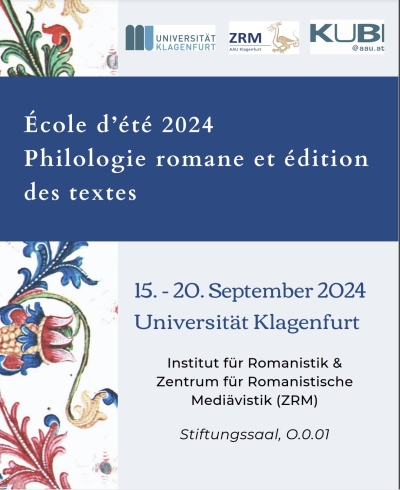
Summer School "Philologie romane et édition des textes"
The ‘École d'été 2024 - Philologie romane et édition des textes’ will be held at the University of Klagenfurt from the 15th to the 20th of September this year.
The summer school has been running for many years and is organised by Stephen Dörr (Heidelberg), Franz Lebsanft (Bonn), Richard Trachsler (Zurich), Raymund Wilhelm (Klagenfurt) and Fabio Zinelli (Paris). The Summer School is very popular and has been a great success in providing young scholars with solid training in text philology and forming international networks. The work at the summer school usually results in a joint book publication.
For more detailed information, find out more directly on the summer school’s website.
Study Day on Allographic texts of the Romance Middle Ages on 04.06.2024
On Tuesday, 4 June 2024, a study day entitled ‘Les textes allographes français et italiens au Moyen Âge’ will take place in Heidelberg, Hochschule für jüdische Studien, Landfriedstraße 12 (room S3). Scholars from the academy project ‘Bible Glossaries as Hidden Cultural Carriers’ and the ‘Manuscripta Italica Allographica’ (MIA) project funded by the Italian Ministry of Science will give a total of six lectures.
The programme will follow, participation is possible without registration.
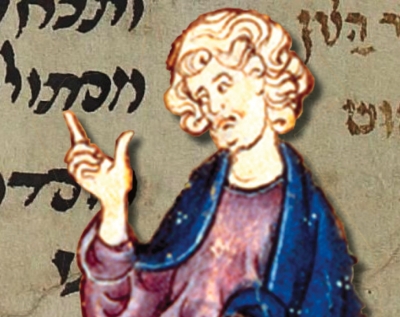
Extract from the poster for the ‘Journée d'étude: Allographic texts of the Middle Ages’
Medieval Day at Heidelberg University
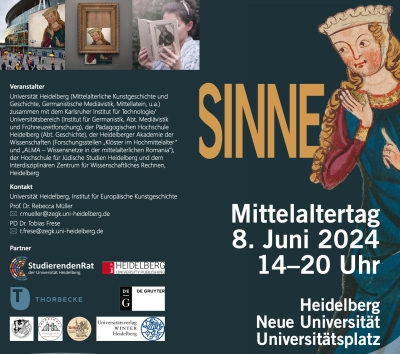
ALMA is taking part in this year's Medieval Day at Heidelberg University, which will take place on June 8th 2024 from 14:00 - 20:00 with activities on the University Square and in the building ‘Neue Universität’. A PDF with the programme can be found here.
Lecture ‘Text philology: A key to understanding our language and history’
In the summer semester 2024 the lecture / exercise on edition philology by S. Tittel took place.
In the summer semester 2024 the lecture on edition philology by S. Tittel took place.
Whether the reader chooses to read the French Parzival with the bilingual text edition in the Reclam volume or a multi-volume academic edition, they are not only holding different books in their hands, but possibly also different versions of the same text. What lies behind this are the methods and schools of text philology, i.e. the academic study of making accessible (historical) text sources. Text philology is a key to understanding our history and culture, as it provides textual sources not only for linguistics and literary studies, but also for historical studies. In the history of text philology, there are several academic schools that apply different methods of textual criticism, i.e. the practical processing of a text source, in order to produce a scientifically reliable edition. We want to have a look at these schools and their sometimes controversial disputes. In addition, important auxiliary sciences such as codicology and palaeography will be presented. Special attention will be paid to the important interaction between text philology and lexicography on the one hand and text philology and historiography on the other hand. Finally, we will also look at the way in which a text edition is compiled and published: traditionally and published as a book versus digitally and published online using technologies and methods from the field of Digital Humanities. The course has a mixed character of lecture and academic exercise (in individual or group work), which should put the theory into practice: we will edit short parts from medieval manuscripts ourselves and reflect on what a more encompassing scientific work on the manuscripts we have looked at could look like. In order to bridge the gap between the exercise and the reality of actual academic work, a visit to a research project focussing on edition philology will also be part of the course.
Opening Event on 28 February 2024
![Szenen aus dem Rolandslied, Simon Marmion - Grandes Chroniques de France, St. Petersburg, Ms. Hermitage. fr. 88 [Niederl. Burgund, Mitte 15. Jh.], Exemplar Philipps des Guten, Folio 154v, https://commons.wikimedia.org/w/index.php?curid=1913372](/sites/default/files/styles/max_400px/public/media/Rolandslied_0_0.jpg?itok=FqYajwBx)
On Wednesday, 28 February 2024 at 18:30, the opening of the Fokus romanistische Mediävistik (FRM) Heidelberg will take place in the Ernst-Robert-Curtius-Saal of the Department of Romance Studies (room 218) at Heidelberg University: Prof. Dr. Raymund Wilhelm (University of Klagenfurt) will give an opening lecture entitled ‘The spread of discourse traditions and the expansion of Romance cultural languages - Religious poetry in the quatrain monorime d'alexandrins in the 13th and 14th centuries’. The event is open to all and the FRM Heidelberg is looking forward to a lively exchange with a large audience over a glass of wine.
Opening speech, Stephen Dörr / Sabine Tittel (originally in German):
Ladies and gentlemen,
We, Sabine Tittel and I, Stephen Dörr, are delighted that you have accepted our invitation to the opening of the ‘Fokus romanistische Medävistik’. Before we hand over to our keynote speaker Raymund Wilhelm, we would first like to tell you why we founded this institution.
As you may know, Sabine and I have spent many years together, shoulder to shoulder, so to speak (since 1997 to be precise, when Sabine joined the team). We were part of the editorial team of the Dictionnaire étymologique de l'ancien français, the DEAF, project of the Heidelberg Academy of Sciences and Humanities, which was originally founded by Kurt Baldinger in 1965 and continued by Frankwalt Möhren until 2007, and finally Thomas Städtler. The second half, the ‘East team’ in the office, which sat opposite us, the ‘West team’, was formed for the longest time by Frankwalt Möhren and Thomas Städtler (and other colleagues in the period after Frankwalt Möhren's transition into his ‘pseudo’ retirement). After the DEAF was cancelled in 2020, we were assigned different tasks: Sabine was placed in the Old Gascon Dictionary (DAG) and the ‘Nepal Project’ of the Heidelberg Academy of Sciences and Humanities and then in a research initiative here at Heidelberg University, and I at the Lessico Etimologico Italiano (LEI) in Mannheim.
To our great surprise and delight, we were then able to acquire two large academy projects in 2022 and 2023: Sabine, together with Maria Selig, Bavarian Academy of Sciences and Humanities, and Wolfgang Schweickard (Elton Prifti is now also one of the principal investigators), Mainz Academy of Sciences and Humanities, the ALMA project - ‘Knowledge Networks in Medieval Romance speaking Europe’ -, and I, together with Hanna Liss, Heidelberg University of Jewish Studies, the project ‘Bible Glossaries as Hidden Cultural Carriers’.
Both projects deal with the Middle Ages and thus continue at least part of the content of the DEAF. In addition, we are both endeavouring to continue to implement the scientific methods - the school of DEAF - and to pass them on to the next generation of scientists. We also want to support this by officially launching the ‘Fokus romanistische Mediävistik Heidelberg’ today. However, this alone was not the reason for founding the FRM. Rather, over the last few decades we have learnt that medieval studies in particular have fallen behind in German-language Romance studies. Text philology can be cited here as a prime example.
When we make this claim, we are in good company. As Franz Lebsanft put it in his 2012 article ‘Le xxie siecle: le crépuscule de la philologie romane en Allemagne ?’: ‘From the point of view of historical linguistics, it is above all the major historical lexicography projects that are maintaining interest in medieval studies, even if it must be recognised that this interest is very limited and that it occupies a rather marginal position in university teaching [...]. On the other hand, the dictionnaires have not been the catalysts of a rethinking of the theoretical problems of textual criticism in Germany, which, incidentally, is not their primary task any more’.
Three years later, Raymund Wilhelm wrote in 2015: ‘L'edizione dei testi nella romanistica tedesca: tendenze attuali e prospettive per un futuro incerto (con uno sguardo alla situazone italiana): ‘I grandi progetti lessicografici, come il DEAF o il LEI, che dipendono rispettivamente dall'Accademia delle Scienze di Heidelberg e da quella di Mainz, sono marginali, infatti, rispetto al mondo universitario. Inoltre questi progetti non sono sostenuti da grandi interessi teorici; nella critica del testo seguono per lo più - o seguivano fino a poco tempo fa - quello che potremmo chiamare un ‘bédierismo di comodo’, limitandosi programmaticamente al singolo (neanche necessariamente il ‘migliore’) testimone ... La Romanische Philologie in quanto medievistica sopravvive, non sappiamo per quanto tempo ancora, soprattutto grazie a istituzioni extra-universitarie.’
We have therefore decided to join forces under the umbrella of the FRM in order to raise the profile of Romance medieval studies once again and to intensify research in the field of the Middle Ages. We plan to organise and advertise several conferences and lectures each year.
In addition to today's lecture by Raymund Wilhelm, we can already announce a study day at the School of Jewish Studies on 4 June 2024 on allographical texts of the Romance Middle Ages, especially in English and French.
Sabine will continue to focus on the Middle Ages in her teaching. And we can well imagine a joint commitment in teaching and for students. At this point I would also like to mention the Klagenfurt summer school on edition philology, in which participants learn how to create an edition of a medieval text [see the entry on this page above].
The developments in Romance Studies teaching, which unfortunately now make it impossible to choose Romance Studies as the second specialisation of the ‘Interdisciplinary Master's in Medieval Studies’, and the recent discussions about what can be done to counter this development in Romance Studies, show how relevant it is to strengthen Romance Medieval Studies again - in teaching and in research!
We can already tell the students present that there are great topics for career papers (master's theses, doctoral dissertations) that centre on medieval sources and themes! And with that, I am now very happy to hand over to Raymund Wilhelm, who, as a proven medievalist and philologist, will show how linguistics and literary studies can go hand in hand!

